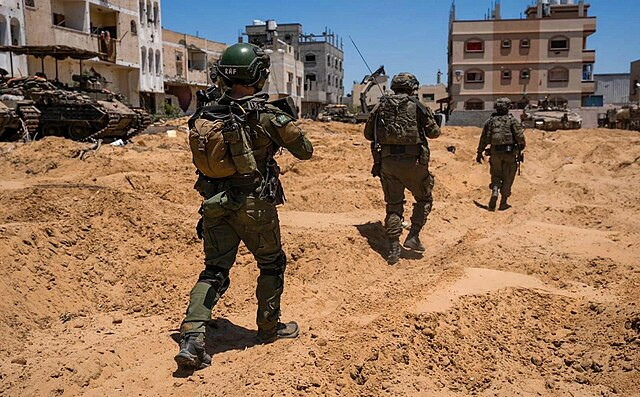Israeli troops and armor advanced further into Gaza City on Wednesday, pressing into the dense Sheikh Radwan neighborhood as air and ground operations intensified and civilian displacement surged, according to residents, local health officials and the Israeli military. Prime Minister Benjamin Netanyahu has ordered the military to take Gaza City, calling it Hamas's last stronghold, even as international calls grow to halt the offensive and hostage families in Israel demand a deal.
Residents described widespread destruction of homes and tent encampments that had sheltered people uprooted by nearly two years of war. "Sheikh Radwan is being burnt upside-down. The occupation destroyed houses, burnt tents, and drones played audio messages ordering people to leave the area," said Zakeya Sami, 60, a mother of five, speaking to Reuters.
The Israeli military said it would continue to operate against "terrorists organizations" in Gaza and to "remove any threat" posed to Israel. Israeli officials have argued Gaza City must be seized to defeat Hamas, which has ruled the strip for nearly two decades but now controls only parts of the territory.
Local health officials said at least 24 Palestinians were killed across Gaza on Wednesday-most of them in Gaza City-while separate reports on Tuesday put the toll across the enclave at 105, including 32 people described as aid seekers. Gaza authorities said Israeli strikes leveled areas in al-Sabra and hit shelters and homes; Israel has accused Hamas of operating within civilian areas.
Humanitarian conditions continued to deteriorate. "Palestinians are in a cage in Gaza City right now, trying to survive as many air strikes as possible. Wherever they go, the air strikes follow them," said Al Jazeera's Hind Khoudary, reporting from Deir el-Balah. Gaza's Government Media Office called Israel's actions "war crimes under international law" and urged the U.N. Security Council to halt what it described as a "brutal genocide."
Amid the fighting, incidents around so-called "safe zones" fueled outrage. Mahmoud Basal, spokesperson for Palestinian Civil Defence, said at least 21 people, including seven children, were killed by a drone strike while queuing for water in the al-Mawasi area near Khan Younis. "They were standing in line to fill up water ... when the occupation forces directly targeted them, turning their search for life into a new massacre," Basal said.
Inside Israel, public pressure to secure the release of remaining captives remains intense. "We need our soldiers back home. We need our hostages back home now. It's been too long for them to stay there. Stop the war now," said Ravid Vexelbaum, 50, from Tel Aviv, as protesters in Jerusalem unfurled a banner reading "You have abandoned and also killed." Tens of thousands of reservists reported for duty this week to support the campaign; a military official has previously said many would backfill non-combat roles to free active units for Gaza.
Cease-fire diplomacy remained stalled. Qatar's Foreign Ministry spokesperson Majed al-Ansari said Hamas had accepted a ceasefire proposal, but "there has been no Israeli response yet," warning that Israel's plan to occupy Gaza "poses a threat to everyone," including Israeli captives. Israeli Army Chief of Staff Eyal Zamir told reservists, "We are going to deepen our operation," as ground actions intensified.
The conflict's regional undertow persisted. Yemen's Houthi movement said it launched drones at sites in and around Tel Aviv and claimed strikes on a Red Sea cargo vessel; Israel has vowed to counter attacks from Iranian-aligned groups. Meanwhile, the Palestinian Foreign Ministry welcomed Belgium's recognition of a Palestinian state and urged others to follow, citing the need to halt "genocide, displacement, starvation, and annexation."
The war began Oct. 7, 2023, when Hamas-led gunmen attacked southern Israel, killing about 1,200 people and taking 251 hostages, including children, into Gaza. Israel says 48 hostages remain in Gaza, 20 believed alive. Gaza's health officials say more than 63,000 Palestinians have been killed since the war's outset, while 367 people-including 131 children-have died of malnutrition and starvation amid acute shortages; Israeli officials acknowledge hunger but reject assertions of famine.
Key figures and developments
- Sheikh Radwan push: Israeli armor and infantry advance inside Gaza City's crowded district.
- Casualties reported: At least 24 killed Wednesday (local health officials); 105 killed Tuesday across Gaza, including 32 aid seekers.
- Humanitarian toll: Gaza authorities report 367 deaths from hunger since war began; widespread shortages continue.
- Hostages: 48 still held in Gaza; 20 thought to be alive, Israeli officials say.
- Mobilization: Tens of thousands of Israeli reservists called up; ground operations to "deepen," per Eyal Zamir.
- Diplomacy: Majed al-Ansari says Hamas accepted a ceasefire proposal; Israel has not responded.
Netanyahu has framed the battle for Gaza City as decisive. Israel's military has urged political leaders to consider a ceasefire, warning continued assaults could endanger both captives and troops, according to Israeli officials. The divide mirrors domestic sentiment increasingly oriented toward a negotiated end that secures hostage releases.






